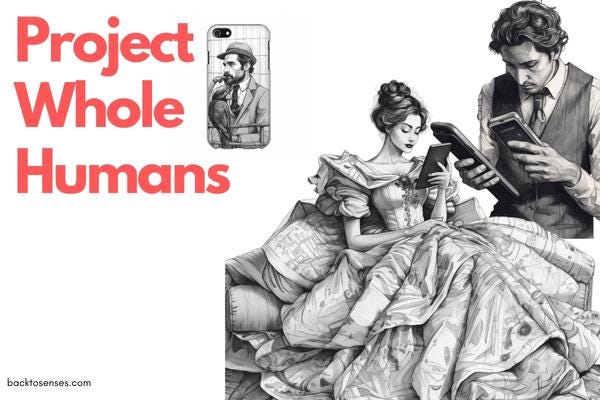Bored but safe. Are we bored out of our minds?
We’re trying to make AI more like humans — and humans more like robots.
We’re trying to make AI more like humans — and humans more like robots.
We focus on minimizing risk, but by minimizing risk, we also rid our lives of surprise, chance, mistakes, and adventure.
We take our supplements, oil the machine, and make everything sterile and predictable.
We are like caged animals — well-fed, safe, and bored out of our minds.
We still crave excitement, but we don’t want to take real risks — loss aversion is a real thing, after all.
Enters the internet: we swipe right and left, up and down. We read about terrifying things happening across the globe because we want to feel something.
Just thinking about living is not living.
The problem is we read, write, or think about our feelings more than we actually feel them.
We analyze and dissect; we organize and catalog. Our obsession with labeling everything is a cry for control, and yet, that is exactly what is driving many of us crazy.
We’re obsessed with safety, and we refine our lives to get rid of it, but life should be like whole grain — we need dirt, we need the struggle, we need some friction. Or we will invent our own.
Leave some room for imagination.
It’s funny how we all want to be more creative and, at the same time — leave no room for imagination, error, or serendipity.
There’s a reason why people would rather administer electric shocks than be bored!
Playgrounds are safe — and boring.
Cities are about consumption and efficiency — if you have no money to spend — there’s not much to do.
Eradicating uncertainty.
You don’t have to start talking to someone and read tiny cues to find out if they are interested in you — they were either a ‘match’ or not.
We think of our lives as if we had an investment portfolio.
We commodify our lives.
Everything is explicit and well-defined.
We behave like we’re just our heads, or frontal lobes, to be precise.
But not really; no, really, it’s not.
We went too far in protecting others — and ourselves — that we walked around padded and isolated.
We don’t see people die; we kind of know they do, but we don’t want to watch it. Instead, we put makeup on dead bodies so they look more alive.
We don’t feel the heat because we sit with the aircon blasting; we don’t feel the cold because we turn the heating on.
We shield and pad and protect and dull life.
Life has become so ‘clean’ that some people need a poop transplant to help their guts function.
But what happens when you put yourself in a float tank, depriving yourself of any sensual input? Our brains start creating their own stuff.
Everything we do is to achieve something else.
We meditate to be more efficient so that we can work more.
We take psychedelics to be more creative; labs are looking for ways to create psychedelics without the ‘psychedelic experience.’
People stopped doing things for their own sake, simply to experience something.
We no longer eat when we’re hungry; we don’t sleep when we’re tired.
We need to be told by gadgets when to eat, what to eat when to sleep, and what we feel.
Life is messy and imperfect, the lines are blurred, and that’s what makes it exciting. So get over it.
We’ve lost touch with our own senses and the world around us.
And to stay sane, we need to get some of it back.
We need to get back to our senses.


